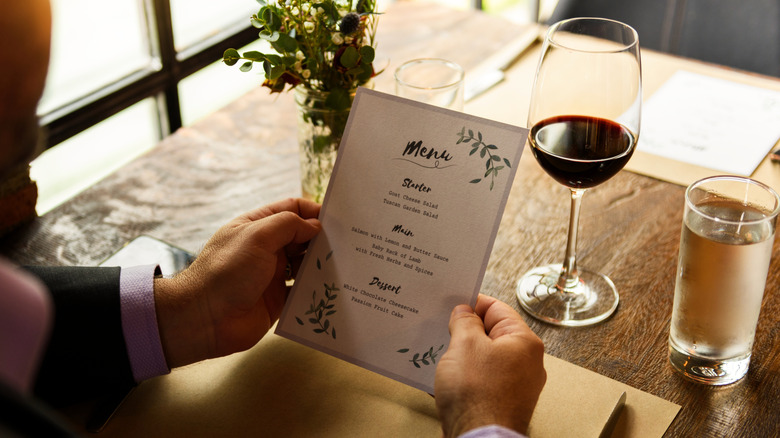The Picky Restaurant Ordering Mistake That's Probably Annoying Your Server
When we sit down at a nice restaurant and read through the menu, sometimes we find something that would be perfect ... if it just had a tweak or two. Before you ask for those substitutions, though, you may want to think twice. Too many special requests risk annoying your server and the restaurant chefs, as well as seriously impeding their workflow.
The primary reason extra requests can irritate your server is because they create extra work for everyone involved. Keeping a restaurant full of hungry diners who are happy and fed requires an incredible amount of effort, both in the front of house and behind the scenes in the kitchen. Every extra request adds on to your server's already busy workload and can slow down service for you and every other table around you.
In addition, even the best chefs sometimes make mistakes, and extra requests arguably make that possibility more likely. Consider that restaurant kitchens are more like assembly lines than anything else. Ingredients are prepared in advance with specific dishes in mind, which means that the kitchen only has so many available at any given time. Chefs have specific cooking and assembly steps memorized and expect certain results based on those ingredients. Altering recipes disrupts the well-oiled machine that is the restaurant kitchen, which can lead to accidents, slowdowns, mistakes, or ingredient shortages.
How many modifications is too much?
When it comes to altering menu items, how far is too far? A lot of it depends on what, where, and when you're eating. If you're in a family-style casual restaurant, your requests are much more likely to be well-received than at a fine dining establishment where a dish is meant to be an experience. Outside of fine dining, though, one or two requests are typically acceptable, especially if they're minor, and removing ingredients is usually fine. Swapping out one sauce for another is usually okay, for example. The same goes if you want alfredo (one of the most important words in an Italian restaurant) instead of another shape of pasta, or even swapping chicken for beef on a burger.
On the other hand, if your dish would become unrecognizable compared to its original form, you've probably gone too far. Menus aren't lists of ingredients to pick and choose from and shouldn't be treated as such. Additionally, don't try to use trendy terms that chefs likely won't know – "plus" and "minus" are two words to avoid using at a steakhouse for exactly this reason.
Of course, all of the above applies to personal preferences. If you're asking for substitutions for dietary, medical, or religious reasons, that's perfectly fine, and you shouldn't hesitate to make that clear to your server. They can help you find a menu item that fits your needs or remove a potentially dangerous ingredient.

